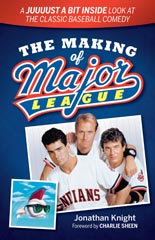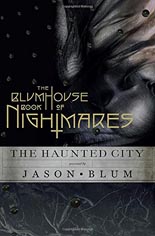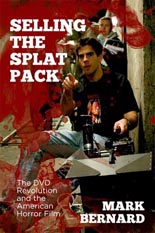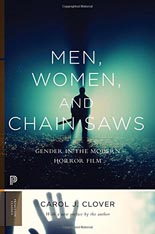 Caseen Gaines’ We Don’t Need Roads isn’t the only current behind-the-scenes book on a hit comedy trilogy born in the 1980s. Jonathan Knight weighs in with The Making of Major League, and you can definitely tell it’s penned by a sportswriter. True to its subtitle of A Juuuust a Bit Inside Look at the Classic Baseball Comedy, the Gray & Company paperback is too “inside baseball,” giving it a, um, “Sheen” of inaccessibility to the average film fanatic. Knight earns points aplenty by interviewing every living important cast member — including Wesley Snipes, Tom Berenger, Rene Russo and, yes, even Charlie Sheen, who also pitched in the foreword — but I’d knock some off for constant overstating of the movie’s status of a cult classic (he contends it has achieved Rocky Horror levels) and for exaggerating drama that suggests the 1989 hit was some sort of industry game-changer. A minor-league Major League aficionado myself, I did learn a lot from the breezy read, including its original “twist” ending, the cutting-room fate of Jeremy Piven and the flick’s curious connection to, of all pics, Clive Barker’s Nightbreed.
Caseen Gaines’ We Don’t Need Roads isn’t the only current behind-the-scenes book on a hit comedy trilogy born in the 1980s. Jonathan Knight weighs in with The Making of Major League, and you can definitely tell it’s penned by a sportswriter. True to its subtitle of A Juuuust a Bit Inside Look at the Classic Baseball Comedy, the Gray & Company paperback is too “inside baseball,” giving it a, um, “Sheen” of inaccessibility to the average film fanatic. Knight earns points aplenty by interviewing every living important cast member — including Wesley Snipes, Tom Berenger, Rene Russo and, yes, even Charlie Sheen, who also pitched in the foreword — but I’d knock some off for constant overstating of the movie’s status of a cult classic (he contends it has achieved Rocky Horror levels) and for exaggerating drama that suggests the 1989 hit was some sort of industry game-changer. A minor-league Major League aficionado myself, I did learn a lot from the breezy read, including its original “twist” ending, the cutting-room fate of Jeremy Piven and the flick’s curious connection to, of all pics, Clive Barker’s Nightbreed.
 With such low-budget/high-return smashes as Insidious, Sinister and Paranormal Activity, producer Jason Blum is Hollywood’s current king of horror. Can he do the same for that slim section of your local bookstore? Judging from the Vintage fiction collection he has edited, The Blumhouse Book of Nightmares: The Haunted City, the Ouija planchette points to “YES.” It sure helps that for the 17 stories selected, he called upon such friends and collaborators as Ethan Hawke, Eli Roth, Scott Stewart and Mark Neveldine, the latter two being the respective directors of Dark Skies and those crazy-ass Crank movies. Although most of these guys are not known for printed fiction, they more than rise to the challenge, jumping mediums without losing the menace. Blum could strike gold by turning some of these tales into an anthology film. (Like that idea, Jason? Just credit me as an executive producer, thanks.)
With such low-budget/high-return smashes as Insidious, Sinister and Paranormal Activity, producer Jason Blum is Hollywood’s current king of horror. Can he do the same for that slim section of your local bookstore? Judging from the Vintage fiction collection he has edited, The Blumhouse Book of Nightmares: The Haunted City, the Ouija planchette points to “YES.” It sure helps that for the 17 stories selected, he called upon such friends and collaborators as Ethan Hawke, Eli Roth, Scott Stewart and Mark Neveldine, the latter two being the respective directors of Dark Skies and those crazy-ass Crank movies. Although most of these guys are not known for printed fiction, they more than rise to the challenge, jumping mediums without losing the menace. Blum could strike gold by turning some of these tales into an anthology film. (Like that idea, Jason? Just credit me as an executive producer, thanks.)
 The aforementioned Roth is one of the primary filmmakers at the (stabbed and bleeding) heart of Mark Bernard’s Selling the Splat Pack: The DVD Revolution and the American Horror Film. In the Edinburgh University Press release, the author examines the business behind pushing the likes of Rob Zombie and the Saw franchise onto audiences of the multiplex and then, more tellingly, to home-video consumers who salivate over discs branded with lurid promises of “UNRATED” cuts and extra content. (Guilty as charged!) Charting the coinage and spread of the “Splat Pack” term across continents, Bernard also discusses how today’s digital platforms have helped lift public opinion of the horror genre from execrable trash to insightful social commentary. While rehashing the histories of fright films and the format wars is unnecessary, Selling the Splat Pack emerges as a smart study in the economics of horror — not to be confused with the horror of economics.
The aforementioned Roth is one of the primary filmmakers at the (stabbed and bleeding) heart of Mark Bernard’s Selling the Splat Pack: The DVD Revolution and the American Horror Film. In the Edinburgh University Press release, the author examines the business behind pushing the likes of Rob Zombie and the Saw franchise onto audiences of the multiplex and then, more tellingly, to home-video consumers who salivate over discs branded with lurid promises of “UNRATED” cuts and extra content. (Guilty as charged!) Charting the coinage and spread of the “Splat Pack” term across continents, Bernard also discusses how today’s digital platforms have helped lift public opinion of the horror genre from execrable trash to insightful social commentary. While rehashing the histories of fright films and the format wars is unnecessary, Selling the Splat Pack emerges as a smart study in the economics of horror — not to be confused with the horror of economics.
 Referenced seemingly everywhere since its original publication in 1992, Carol J. Clover’s Men, Women, and Chain Saws: Gender in the Modern Horror Film is now available in an affordable paperback edition as part of the Princeton Classics line. While the reprint sports a snazzy new cover, the interior layout has been ported, resulting in the photos appearing cruddy and muddy. It’s easy to see why this book is considered such a landmark in film analysis, and in her new, five-page preface to this edition, Clover boils the appeals of horror down to a sentence: “The point is fear and pain — hers and, by proxy, ours.” She’s referring to the concept of the slasher’s Final Girl — a now-widespread term she birthed. As her chapter within the also recently reprinted The Dread of Difference: Gender and the Horror Film shows, she performs skillful and credible dissections on mass-market horror shows like Alien and The Texas Chain Saw Massacre, but it’s her essay on rape-revengers — and defense of 1978’s notorious I Spit on Your Grave in particular — that she most excels. —Rod Lott
Referenced seemingly everywhere since its original publication in 1992, Carol J. Clover’s Men, Women, and Chain Saws: Gender in the Modern Horror Film is now available in an affordable paperback edition as part of the Princeton Classics line. While the reprint sports a snazzy new cover, the interior layout has been ported, resulting in the photos appearing cruddy and muddy. It’s easy to see why this book is considered such a landmark in film analysis, and in her new, five-page preface to this edition, Clover boils the appeals of horror down to a sentence: “The point is fear and pain — hers and, by proxy, ours.” She’s referring to the concept of the slasher’s Final Girl — a now-widespread term she birthed. As her chapter within the also recently reprinted The Dread of Difference: Gender and the Horror Film shows, she performs skillful and credible dissections on mass-market horror shows like Alien and The Texas Chain Saw Massacre, but it’s her essay on rape-revengers — and defense of 1978’s notorious I Spit on Your Grave in particular — that she most excels. —Rod Lott
